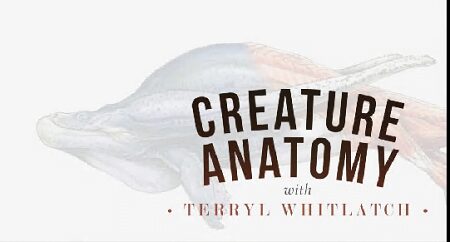
Schoolism – Creature Anatomy with Terryl Whitlatch | 13.22 GB
This course is an in-depth exploration into the creation of imaginary animals based on the anatomy of real animals, in order to invent plausible beings for the concept, animation and entertainment arts.
Lesson 1 – Introduction to Creature Design, Tetrapod, and Human Anatomy
In my first lesson, I’ll begin with an introduction and course overview that will familiarize you with what creatures are, in relation to both the entertainment arts and science, and how zoology and professional creature design go hand in hand. We’ll examine the “why” of the creature, and how to gather research in order to design with intent and plausibility. Next, we’ll go over the fundamentals of basic animal anatomy, and then start out with designing a creature based on and yet departing from, the basic human anatomical model.
Lesson 2 – Fish, Amphibians, and Reptiles
Fish, amphibians, and reptiles provide some of the most basic, primeval, and yet quite sophisticated anatomical models when it comes to creature design. So many of our favorite characters, from The Incredible Mr. Limpet and Jaws, to the denizens of Yoda’s planet, Dagobah in Star Wars come from these groups. We will examine each of their zoologies and anatomies and learn how they are similar and different from one another, and then go on to create our own fantastic creatures based on what we’ve learned.
Lesson 3 – Dinosaur and Bird Anatomy
Dinosaurs straddle the line between fantasy, science fiction, and reality, and birds are their real life descendants that are all around us. As the inspiration of dragons and wyverns, we’ll study the two main groups of dinosaurs, and see how they are quite different from other reptiles. We’ll examine their anatomical kinship with birds, and from there, take a good look at wing and feather structure. If you love Jurassic World and The Roadrunner from Loony Toons alike, this lesson is for you.
Lesson 4 – Canine and Feline Anatomy
Dogs and cats are some of our most beloved animal companions, and appear widely throughout popular entertainment. However, how closely have we studied them to see how they and their wild relatives are anatomically put together? In this lesson we will learn what makes a dog a dog, and a cat a cat, and how to invent imaginary creatures that are undeniably canine or clearly feline – so many plots and story lines are dependent on this very distinction!
Lesson 5 – Hoofed Mammals
Hoofed mammals are some of the most intelligent, beautiful, swift, and bizarre of all real animals. In fact no other animal has had more impact on human civilization and storytelling than the horse. We will look closely at the various anatomies and differing zoologies of the main two groups of hoofed mammals, and transfer our knowledge into creating amazing hoofed creatures that will carry us into our dreams.
Lesson 6 – Elephant Anatomy
When one looks at an elephant, one feels prehistory coming to life. Indeed, these modern animals have an ancient lineage, as we’ll see while comparing elephant, mammoth, mastodon, and other prehistoric elephant anatomies with each other. We’ll go on to create gigantic behemoths to roam sci-fi cenozoic-type planets, or even tiny species for an elven world – stretching the imagination while keeping believability is the goal.
Lesson 7 – The Narrative Illustration – Part 1
We do not invent imaginary creatures or stylize real animals for them to exist in a vacuum, but rather, to help tell stories within the worlds they are invented for. These visual development illustrations are what movies, games, and graphic novels are made from. In this lesson we’ll focus on the profound relationship between story, scene, layout/composition, and creature-ly subject matter – and get started in creating narrative (storytelling) concept illustrations of our own.
Lesson 8 – Complex Poses and Problem Areas
The anatomy of animals allows them to assume an infinite variety of poses and positions, which is necessary to both their survival and enjoyment of life, and indeed your creatures must be able to do the same, both in animation, and in the context of narrative illustration. Even after studying anatomy intensively, however, that very same anatomy can seem very puzzling when exhibited by the living animal, depending upon our point of view, or familiarity with that animal. In this class, we will analyze what is actually going on in a selection of challenging poses, and learn to put our creatures into equally dynamic positions as well.
Lesson 9 – The Narrative Illustration – Part 2
In this final lecture, we’ll continue to delve deeper into professional concept/narrative illustration, reviewing the fundamentals, but also going more in-depth into compositional considerations for movies/cinematics and graphic novels, including emphasis on character, traveling and action, crowd scenes and layering. We’ll also examine the emotional/spiritual impact of color, light, and environment, all using real and imaginary creatures, and follow the step-by-step creation of another complex concept illustration. We will see how it really is the story that designs the creature.





